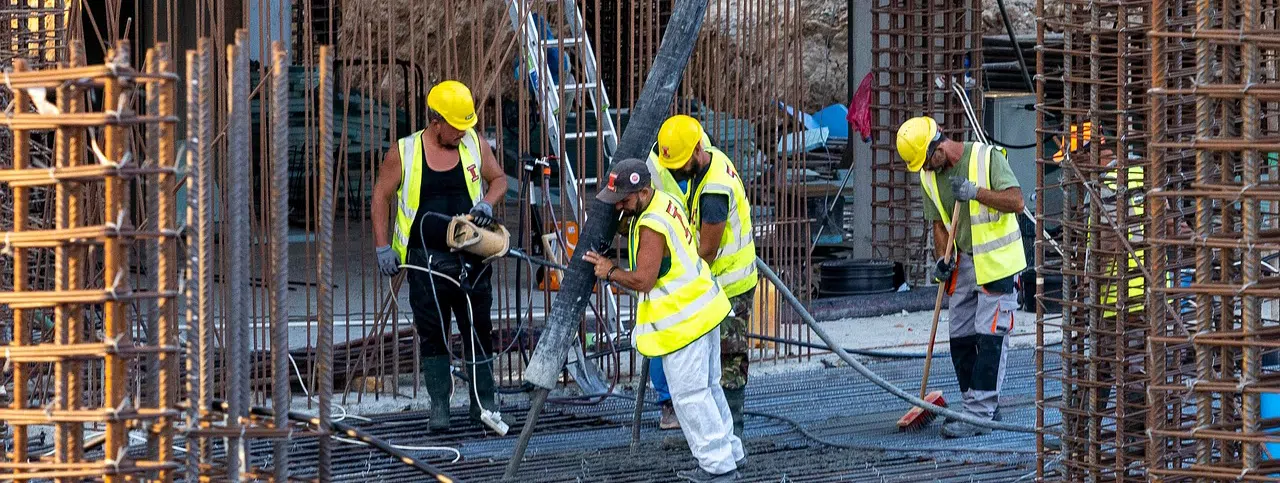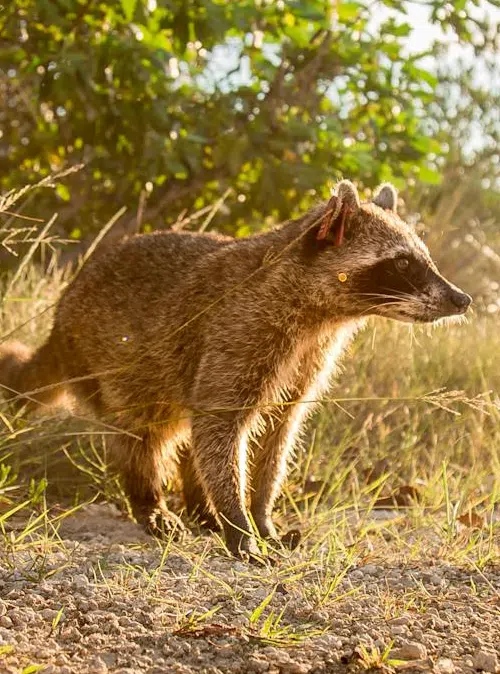Construction sites and partially completed buildings are high-risk targets for raccoons in the GTA, especially when cold weather hits. While tool storage areas and unused structures or equipment provide shelter, protection, and warmth, construction materials like insulation easily double as den linings. Food scraps and trash add to the attraction of construction sites.

Such infestations pose serious health and safety risks, compromise materials and the structural integrity of building projects, halt inspections, and create legal liability for construction companies, property owners, and developers. Of course, nearby residents will often notice a stark increase in raccoon sightings in their own backyards.
Why Unfinished Construction Sites Attract Raccoons
Construction sites are generally quiet and free of activity during the hours between dusk and dawn - and this is precisely when raccoons are most active. Here are some other considerations:
The Perfect Microclimate
In a newly constructed building, a roof structure is often finished long before the interior walls are sealed. This creates a large, enclosed space that traps residual heat from the concrete foundation and shields the entire area from wind, offering a safe, dry "micro-climate" that’s perfect for winter torpor.
Abundant Nesting Material for Raccoon Nesting Sites
Readily available materials including loose insulation, cardboard packaging, plastic sheeting, and discarded fabric are all utilized by raccoons to create insulated winter dens.
Ease of Access
Unlike finished buildings, construction sites are rarely fully sealed. Raccoons exploit:
- Uncovered elevator and utility shafts.
- Missing windows/doors (covered only by poly sheeting).
- Open joists and wall cavities.
- Unfinished roofing/venting penetrations.
- Unsealed vents, ducts, or chimneys.
- Gaps in temporary fencing or plywood barriers.
- Damaged tarps, scaffolding openings, or roof gaps.
- Open basement or utility access points.
 Raccoon Removal in Unfinished Buildings & Construction Sites: The Cascading Costs and Liability Risks
Raccoon Removal in Unfinished Buildings & Construction Sites: The Cascading Costs and Liability Risks
Financial Impact (Project Delays)
The discovery of wildlife can halt all work in that section of the site until animals and biohazards are cleared. This leads to costly project delays, wasted labour time, and potentially missing milestone deadlines.
Compromised Materials & Structure
- Insulation & Drywall
Urine, feces, and trampling/scratching damage destroy insulation (requiring costly replacement) and stain unfinished drywall or wood. - Chewed Wiring
Raccoons chew on low-voltage wires and exposed electrical conduits, leading to faults that must be traced and rewired by licensed electricians before walls are sealed. If left unchecked, this can lead to fires.
Adjacent Property Risk (The Spread)
Raccoons often use vacant building as a hub. They commute to nearby finished properties (e.g., adjacent homes or neighbouring businesses) for food, increasing conflict within the community and drawing negative attention to the ongoing construction project.
- Migration Effect: Once construction is completed, raccoons may move to nearby homes, offices, or condos.
- Cross-Infestation Risk: Neighbouring buildings face increased intrusion pressure.
- Garbage Attraction: Improper waste management at construction sites draws raccoons into the area, spreading problems to surrounding neighborhoods.
Raccoon Control in the GTA: Who Is Responsible for Construction Site Raccoon Conflicts?
Developers, project managers and property owners are legally responsible for controlling raccoon infestations and the associated cleanup costs, regardless of the site's status, as part of their responsibility in keeping construction sites and unfinished buildings secure and wildlife-free. Property damage caused by wildlife might not be covered if negligence is proven.
Raccoon Control Challenges on Construction Sites
- Constant site changes (e.g., temporary walls, moving machinery) make prevention difficult.
- Weather conditions limit access to all areas (often leading to winter raccoon problems)..
- Raccoon removal at construction sites requires specialized wildlife control planning integrated with site safety protocols.
Professional Raccoon Removal and Prevention Strategies
- Inspection and Monitoring
Use of motion cameras and night surveillance to detect raccoon movement. - Humane Trapping and Removal
Permanent raccoon removal is the only solution that guarantees that the same animal(s) won't breach the site over and over. - Securing the Site
Seal entry points such as vents, ducts, attics, and crawl spaces.
Reinforce fencing, cover dumpsters, and secure scaffolding openings.
Sanitization and Restoration
- Removal of droppings, damaged insulation, and contaminated materials.
- Strict safety protocols must be observed when disinfecting the area.
Permanent Raccoon Removal for Construction Sites
In Ontario, trapped wildlife has to be relocated within a one kilometre radius from the capture site. Relocating a raccoon near a massive, warm shelter it has already breached guarantees its immediate return.
For construction, permanent removal of raccoons is the fastest, most decisive way to clear the site of health hazards and prevent the risk of delay, allowing the project to proceed without the threat of the animal re-breaching the structure.
The Hawkeye Guarantee: Hawkeye Bird & Animal Control is the only wildlife agent offering permanent raccoon removal (humane euthanasia) in Toronto and across the GTA. The animals we trap WILL NOT return. GUARANTEED.
Raccoon Removal Cost for Unfinished Construction Sites
As with all wildlife removal, the cost depends on how many animals have breached the site, how many traps are needed, and how many times a technician has to visit the site. Raccoon removal rates for construction sites start at $225 per visit.
Winter Maintenance and Prevention Tips for Developers
- Conduct bi-weekly site inspections during off-hours to check for signs of raccoon damage to the construction site and droppings.
- Store waste in sealed containers and remove food waste daily.
- Install wildlife-proof fencing or mesh barriers around the site perimeter.
- Keep building interiors sealed to prevent wildlife attraction.
How Nearby Property Owners Can Protect Themselves
- Inspect roofs, chimneys, siding, attics, vents, and garages if construction is happening nearby.
- Avoid leaving pet food or waste bins outdoors.
- Reduce or eliminate standing water, including bird baths.
- Contact a licensed, insured, and experienced wildlife removal service at the first sign of raccoons on your property.
FAQs
Q: Will our insurer deny claims if raccoon damage is found in an unfinished structure?
A: A builders risk policy covers damages to the physical structure being built and the materials on site. However, coverage for wildlife damage is often limited or excluded as construction companies have a duty to mitigate their environmental impact and protect wildlife. To manage animals on or around the site, a construction company may hire a professional wildlife control specialist. These specialists carry their own liability and professional insurance to cover their work.
Q: It is possible to use DIY methods like deterrents and repellants to get rid of raccoons?
A: DIY methods are largely ineffective in keeping the animals away, especially in a large, exposed area.
Q: Can I kill raccoons on my construction site?
A: It is not illegal to kill raccoons in Ontario, as long as you do not use poison.
Q: Does wildlife damage affect our final municipal occupancy inspection?
A: Not unless any damages aren’t properly repaired before final inspection.
Q: If we find a raccoon, how quickly can the site be cleared?
A: With a bit of luck, the raccoon can be caught within 24 hours. It really depends on the right trap and the right location. It is generally far more cost effective to hire a professional raccoon removal service, particularly if you are dealing with a trap-shy raccoon.
Q: What if we find a dead raccoon on our construction site?
A: Call your local animal control immediately. In many cities you can simply dial 3-1-1. Do not touch or move the animal unless animal control instructs you to do so.
Q: Can raccoons cause long-term odour problems after removal?
A: Yes, odours can linger for a long time if the clean-up and disinfection was not done completely or correctly. Urine soaked into wood or drywall can also cause mold issues.
Q: Should raccoon prevention be part of a construction safety plan?
A: Yes, absolutely - prevention is always a good idea. Workers should be briefed on best practices and what to look out for. Bi-weekly inspections are necessary.
Permanent Raccoon Removal for Construction Sites
When it comes to raccoon infestation prevention on construction sites, hiring licensed wildlife control experts for safe and permanent raccoon removal makes sense from a financial point as well as for the health and safety of crews and inspectors. Hawkeye Bird & Animal Control is the only company that offers permanent raccoon removal in the GTA.
If you suspect raccoon activity around your construction or nearby property (this winter), contact Hawkeye for a permanent raccoon removal solution.
Hawkeye's raccoon removal services are available all across Southern Ontario, including Toronto, Scarborough, Brampton, Vaughan, Markham, Ajax, Pickering, Newmarket, Etobicoke, Oshawa, and Mississauga.
Related Articles:
https://www.hawkeye.ca/raccoon-control-trapping-and-removal
https://www.hawkeye.ca/toronto-raccoon-removal-control
https://www.hawkeye.ca/blog/how-to-permanently-remove-raccoons-in-vaughan














